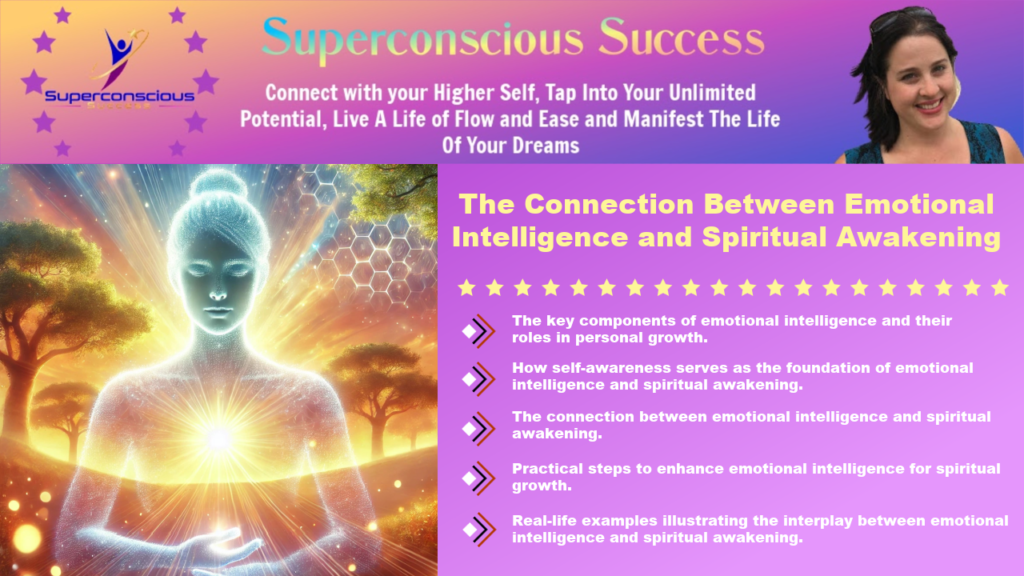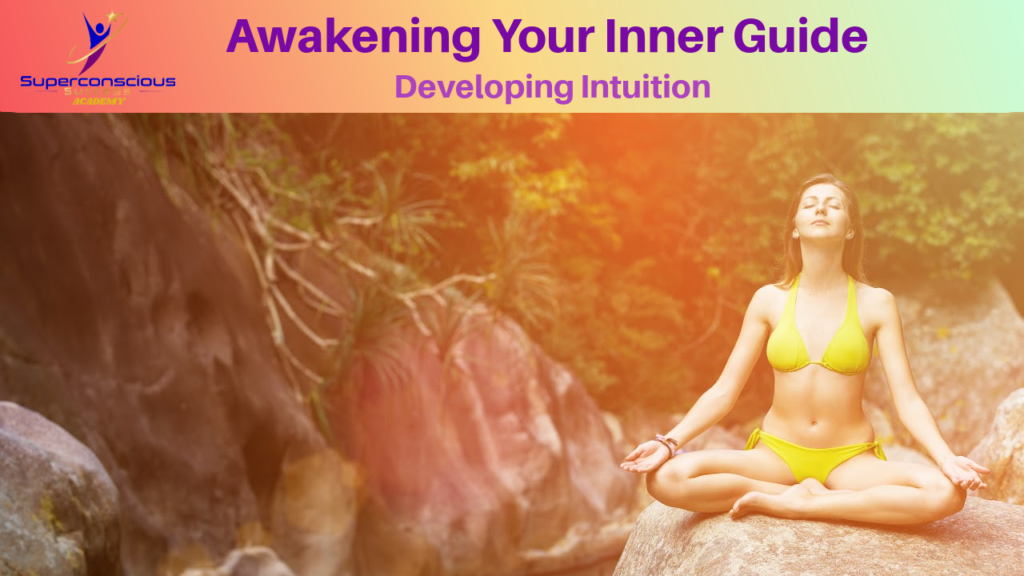
Welcome to this enlightening blog post! Here, you’ll learn how emotional intelligence and spiritual awakening are interconnected and how enhancing your self-awareness can lead to profound personal growth. We will explore the key components of emotional intelligence, the essence of spiritual awakening, and practical steps to boost your EI to support your spiritual journey. By the end of this post, you’ll have a deeper understanding of these concepts and actionable strategies to apply them in your life. Let’s embark on this transformative journey together!
Page 1
Page 2
Additional Information
Understanding Emotional Intelligence
Emotional intelligence (EI) is the ability to understand, control, and evaluate emotions. It consists of five key components: self-awareness, self-regulation, motivation, empathy, and social skills. These elements work together to help you manage your emotions and navigate relationships effectively.
Self-Awareness
Self-awareness is the foundation of emotional intelligence and involves the ability to recognize and understand your own emotions. It’s not just about identifying what you’re feeling in the moment, but also understanding the deeper reasons behind those emotions and how they influence your thoughts, behaviors, and decisions.
When you’re self-aware, you can observe your emotional responses without becoming overwhelmed by them. This awareness helps you identify patterns in your feelings, recognize triggers that provoke certain emotions, and understand how your mood impacts your interactions with others. For instance, if you’re feeling frustrated, self-awareness enables you to pinpoint the source of that frustration, whether it’s due to a specific situation, unmet expectations, or internal conflict.
Moreover, self-awareness involves being in tune with your motives and desires. It allows you to question why you feel a certain way about something and whether those feelings align with your core values and long-term goals. For example, if you notice feelings of jealousy, self-awareness helps you explore whether it stems from insecurity, fear of missing out, or a genuine desire for what someone else has.
By developing self-awareness, you gain a clearer understanding of how your emotions shape your thoughts and actions. This clarity empowers you to respond more thoughtfully and intentionally in various situations, rather than reacting impulsively. Over time, self-awareness cultivates a deeper connection with yourself, enabling personal growth, emotional balance, and more meaningful relationships with others.
Self-Regulation
Self-regulation is a critical component of emotional intelligence that goes hand-in-hand with self-awareness. Once you’ve recognized your emotions, self-regulation is the next step, focusing on how you manage and respond to those emotions. It’s about exercising control over your emotional reactions to ensure they are in line with your values and long-term objectives, rather than giving in to impulsive actions that you might later regret.
When you practice self-regulation, you develop the ability to pause before reacting, giving yourself the space to choose a more measured and appropriate response. For instance, if you’re confronted with a challenging situation at work, self-regulation allows you to avoid an outburst of anger or frustration. Instead, you can take a deep breath, assess the situation calmly, and respond in a way that aligns with your professional values and goals.
This skill is particularly important in maintaining healthy relationships, both personally and professionally. By managing your emotional responses, you prevent negative emotions from escalating conflicts or damaging your interactions with others. For example, in a disagreement with a partner, self-regulation helps you stay calm and communicate constructively, rather than letting anger lead to hurtful words or actions.
Self-regulation also supports long-term success by helping you stay focused on your goals. It empowers you to resist short-term temptations that might derail your progress. For instance, when pursuing a goal like healthy living, self-regulation helps you manage cravings and maintain discipline, ensuring that your actions are consistent with your long-term vision.
Ultimately, self-regulation is about mastering your emotions rather than being controlled by them. It involves staying adaptable in the face of change, maintaining a positive outlook in challenging circumstances, and responding thoughtfully instead of reacting impulsively. By aligning your emotional responses with your values and goals, self-regulation ensures that you make decisions that lead to long-term fulfillment and success.
Motivation
Motivation, when viewed through the lens of emotional intelligence (EI), goes far beyond the pursuit of external rewards like money, status, or recognition. While those rewards can be motivating, true motivation in the context of EI is rooted in a deeper, more intrinsic drive. This internal motivation is what propels individuals toward continuous learning, self-improvement, and personal growth.
For those with high emotional intelligence, motivation is driven by a genuine passion for becoming the best version of themselves. They are not merely chasing accolades or approval; instead, they are motivated by the satisfaction of mastering new skills, overcoming challenges, and achieving personal goals. This intrinsic drive is what fuels their persistence, even in the face of setbacks or adversity.
This internal motivation is also closely linked to resilience. When challenges arise, individuals with high emotional intelligence are less likely to be discouraged by failure or obstacles. Instead, their passion for growth helps them view setbacks as opportunities for learning and improvement. This resilient mindset enables them to bounce back from difficulties with renewed energy and determination, rather than giving up.
Moreover, this kind of motivation encourages a lifelong commitment to personal and professional development. High EI individuals are constantly seeking ways to expand their knowledge, enhance their skills, and evolve as individuals. Whether it’s through formal education, experiential learning, or self-reflection, they are driven by an unwavering desire to grow.
Ultimately, motivation in the context of emotional intelligence is about aligning your actions with your deeper values and aspirations. It’s about finding meaning in what you do and allowing that meaning to propel you forward, regardless of external circumstances. This internal drive not only contributes to personal success but also to a fulfilling and purpose-driven life.
Empathy
Empathy, often considered the cornerstone of emotional intelligence (EI), is the ability to truly understand and resonate with the emotions of others. It goes beyond simply recognizing someone’s feelings; it involves sharing in those emotions, creating a deep sense of connection and mutual understanding. When you practice empathy, you step into someone else’s shoes, seeing the world from their perspective. This insight allows you to respond to them in a way that is compassionate and supportive.
Empathy plays a critical role in building stronger, more meaningful connections with others. When people feel understood and validated, it fosters trust and openness in relationships. This emotional bond is essential in both personal and professional interactions. In friendships, empathy helps you navigate conflicts, celebrate successes, and provide comfort during difficult times. In the workplace, it enhances collaboration, reduces tension, and leads to more effective teamwork.
Moreover, empathy allows you to communicate more effectively. By understanding the emotions behind someone’s words, you can respond in a way that truly addresses their needs and concerns. This deeper level of communication helps to prevent misunderstandings and strengthens the overall quality of your interactions.
In leadership, empathy is especially powerful. Leaders who demonstrate empathy can inspire and motivate their teams by recognizing and addressing their emotional needs. This not only boosts morale but also creates a work environment where people feel valued and supported.
Empathy also contributes to your personal growth. By understanding the emotions and experiences of others, you broaden your perspective and develop a deeper appreciation for diversity. This enriches your life and helps you navigate the complexities of human relationships with greater ease and compassion.
Ultimately, empathy is the foundation upon which meaningful relationships are built. It allows you to connect with others on a profound level, fostering trust, mutual respect, and lasting bonds. Through empathy, you not only enhance your own emotional intelligence but also create a positive impact on the lives of those around you.
Social Skills
Social skills encompass essential abilities that enable effective communication and positive interactions with others. Key components include active listening, conflict resolution, and the ability to inspire and lead.
Active listening involves fully focusing on the speaker, understanding their message, and responding thoughtfully. This skill fosters trust and makes others feel heard, strengthening both personal and professional relationships.
Conflict resolution is crucial for managing disagreements. High emotional intelligence aids in staying calm, understanding different perspectives, and finding mutually beneficial solutions, ultimately strengthening relationships.
In leadership, the ability to inspire and guide others is vital. Leaders with strong social skills connect emotionally with their teams, motivate them, and foster a positive environment. They can articulate a clear vision and encourage collaboration.
High emotional intelligence enhances social competence by allowing you to navigate interactions more effectively, adjust communication styles, and build stronger connections. This is particularly important in leadership, where social skills are essential for creating networks, resolving conflicts, and achieving goals.
In summary, social skills are foundational to successful relationships and effective leadership. By developing these abilities, you enhance your emotional intelligence, improve your interactions, and increase your success in both personal and professional spheres.
The benefits of high emotional intelligence are vast. In personal relationships, it leads to greater empathy and understanding, resulting in enhanced satisfaction. Professionally, individuals with high EI excel in teamwork and manage stress more effectively, contributing significantly to overall well-being.
Defining Spiritual Awakening
Spiritual awakening is a profound shift in consciousness, leading to a deeper understanding of yourself and the universe. This transformative process often brings heightened intuition, inner peace, and a sense of interconnectedness. As you experience spiritual awakening, you may gain clarity about your purpose and existence.
Signs of spiritual awakening include increased sensitivity to emotions and energies, a deep sense of empathy, and unity with the world. This journey often prompts reevaluation of your values, relationships, and goals, leading to a more authentic and fulfilling life.
Triggers for spiritual awakening vary widely. They can include significant life events, deep introspection, or practices like meditation. Whether gradual or sudden, spiritual awakening shifts your perception, guiding you toward a more enlightened state of being.
Continue Reading (Page 2)
The Interplay Between Emotional Intelligence and Spiritual Awakening
Emotional intelligence and spiritual awakening are deeply interconnected, each enhancing the other. Emotional intelligence involves recognizing, understanding, and managing emotions, which is crucial for spiritual growth.
Higher emotional intelligence fosters self-awareness, a key factor in spiritual awakening. As you become more attuned to your emotions, you gain deeper self-understanding, encouraging introspection and spiritual progress. Emotional regulation, another vital aspect of EI, helps manage emotional highs and lows, ensuring stability in your spiritual journey.
Empathy enriches your spiritual experience by enhancing your ability to connect with others, fostering a sense of unity and interconnectedness. This connection broadens your perspective, strengthening relationships and deepening your spiritual insights.
Consider Jane’s story: Through mindfulness and EI, she navigated her spiritual awakening with grace. Initially overwhelmed, Jane used her EI skills to stay grounded, which deepened her spiritual insights and enriched her relationships, illustrating the powerful interplay between emotional intelligence and spiritual awakening.
Practical Steps to Enhance Emotional Intelligence for Spiritual Growth
Enhancing emotional intelligence is essential for spiritual growth, as it supports deeper self-awareness and fosters meaningful connections with others. Here are practical steps to integrate into your daily routine to boost your emotional intelligence and enrich your spiritual journey:
Journaling
Journaling is a powerful practice for gaining deeper insights into your thoughts and emotions. By regularly writing down your experiences, feelings, and reflections, you create a space to explore and understand your inner world. This practice helps clarify your motives, desires, and emotional responses, providing a clearer picture of how they influence your behavior and decision-making.
Seek Feedback
Engaging with trusted friends, mentors, or coaches can offer valuable perspectives on your emotional responses and growth. Constructive feedback helps you recognize blind spots, understand how others perceive you, and refine your emotional intelligence. This external insight can guide you in making necessary adjustments and enhancing your self-awareness.
Self Reflective Practices
Incorporating practices such as meditation and mindfulness into your routine helps you observe your thoughts and emotions without judgment. Meditation encourages a state of calm and clarity, enabling you to reflect on your inner experiences more deeply. This heightened awareness supports better self-regulation by allowing you to respond thoughtfully rather than react impulsively.
Deep Breathing Exercises
Simple yet effective, deep breathing exercises help manage stress and maintain emotional balance. By focusing on your breath, you activate the body’s relaxation response, which calms the nervous system and stabilizes your emotions. This practice is crucial for maintaining composure during challenging situations and making informed, balanced decisions.
Developing a Positive Mindset
Cultivating a positive mindset plays a significant role in emotional regulation. By focusing on positive aspects of life and embracing an optimistic outlook, you foster resilience and improve your ability to cope with setbacks. A positive mindset also enhances your overall well-being, contributing to a more balanced emotional state.
Active Listening
To nurture empathy and strengthen relationships, practice active listening. This involves fully concentrating on the speaker, understanding their message, and responding thoughtfully. Active listening helps you connect more deeply with others, build trust, and enhance your ability to empathize with their experiences and emotions.
Open Communication
Honest and open communication fosters trust and mutual respect in relationships. By expressing yourself clearly and listening to others with an open mind, you build stronger connections and improve your social skills. Effective communication is essential for resolving conflicts, inspiring others, and leading with empathy.
Explore our Offers
Explore our podcast episodes on spirituality and personal growth, and join our FREE TUWC Family Membership for exclusive content and connections. Visit our About Page to learn more about Super Conscious Success. We’re excited to introduce our sister sites, each focused on different aspects of holistic wellness. The Self Empowered Empath supports empaths with emotional and mental health, Ask Naturopath Jen offers physical health and holistic wellness tips, and Tri-Unity Wellness Collective provides personalized coaching. Plus, explore TUWC Academy for diverse courses across five mini academies, including spiritual health, emotional wellness, physical health, conscious parenting, and spiritual entrepreneurship.
Additional Posts/Resources
Discovering Your Life Purpose Through Spiritual Awakening(Opens in a new browser tab)
Emotional Intelligence: The Gateway to Intuitive Mastery(Opens in a new browser tab)
Self-Discovery and Emotional Intelligence Toolkit
Unlock Your Emotional Potential with Our Free Toolkit!
Ready to enhance your emotional intelligence and build stronger connections? Our Self-Discovery and Emotional Intelligence Toolkit is your gateway to deeper self-awareness, effective self-regulation, and improved social skills. This free resource includes practical exercises, reflective prompts, and tools to boost your motivation, empathy, and communication abilities. Start your journey to personal growth and meaningful relationships today—download the toolkit and take the first step towards a more balanced and empowered you!

















